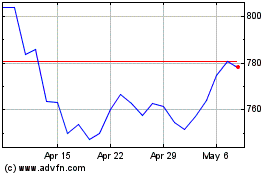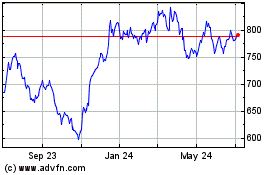BlackRock, Vanguard Raise Price of Cash Redemption for Some ETFs
March 20 2020 - 7:58PM
Dow Jones News
By Dawn Lim and Justin Baer
BlackRock Inc. and Vanguard Group made it more expensive for
large Wall Street traders to redeem shares in some exchange-traded
funds for cash this week, an acknowledgment of the deteriorating
liquidity in markets around the world.
BlackRock on Friday raised the costs of cashing out of a $6
billion short maturity bond ETF to the maximum limit for bank
middlemen, intermediaries and other large investors involved in
exchanging ETF shares for their underlying investments. The fund,
known as the iShares Short Maturity Bond ETF, now charges 200 basis
points on cash redemptions, a four-fold increase from 50 basis
points yesterday, according to people familiar with the matter.
The cost of the charge will be applied as a discount on what
price the seller cashes out on, said one of the people.
The unprecedented stress on markets is making liquidity
increasingly more expensive. Liquidity is the ease at which
investors can cash out of assets without sacrificing gains.
More investors are afraid that firms who rely on short-term
funding won't be able to repay their debt as the coronavirus takes
a growing toll on U.S. business.
BlackRock's surcharge on cash redemptions from the fund -- known
by its ticker NEAR -- fluctuates daily. Investors can avoid the
charges if they choose to exchange the ETF shares for the
underlying securities. The charges don't apply to investors who
trade ETFs on exchanges.
A BlackRock spokesman said Wall Street intermediaries made $100
million in cash redemptions from the fund the same day the change
was made.
Blackrock, in a memo to Wall Street executives on Friday, said
"reduced market liquidity and significant dealer balance sheet
capacity constraints have caused prices of short duration
instruments to sharply decline." The note, which was viewed by The
Wall Street Journal, followed a sharp selloff in the short maturity
bond market on Thursday.
The fund's price declined by about 6% on Thursday. BlackRock in
its memo said "we believe that NEAR's market price was reflecting
the underlying market given the falling price levels in the
underlying bonds and the potential execution uncertainty." The
fund's price is up by more than 2% today.
Some of the BlackRock ETF's holdings include debt issued by Ford
Motor Credit Co., Charter Communications and Nissan Motor
Acceptance Corp.
Higher surcharges show the pressures facing Wall Street players
critical to the orderly functioning of the $6 trillion ETF
industry. Each day bank intermediaries and other Wall Street
middlemen buy baskets of instruments to exchange for shares of
ETFs, or vice versa, in an attempt to profit from price
differences. Their work keeps ETF prices closely in check with
their underlying investments.
Vanguard also is imposing new costs for such large
intermediaries who want cash redemptions from two ETFs. This week
the company imposed a surcharge of up to 200 basis points on cash
redemptions from the Vanguard Mortgage-Backed Securities ETF and
the Vanguard Total International Bond ETF.
The two Vanguard funds collectively manage nearly $40 billion in
assets. The surcharges on cash redemptions is 50 basis points right
now. Vanguard didn't charge any cash redemption fees
previously.
"These fees are in place to defray the impact of transaction
costs on behalf of shareholders, particularly during this period of
unprecedented volatility in bond markets," a Vanguard spokesman
said.
In a sign of the challenges facing the U.S. economy, the Federal
Reserve stepped in to calm short-term debt markets earlier this
week with a plan to lend to U.S. companies in the commercial-paper
market. The Fed had deployed a similar facility between 2008 and
2010 in a bid to lift the economy out of the financial crisis.
Write to Dawn Lim at dawn.lim@wsj.com and Justin Baer at
justin.baer@wsj.com
(END) Dow Jones Newswires
March 20, 2020 19:43 ET (23:43 GMT)
Copyright (c) 2020 Dow Jones & Company, Inc.
BlackRock (NYSE:BLK)
Historical Stock Chart
From Mar 2024 to Apr 2024

BlackRock (NYSE:BLK)
Historical Stock Chart
From Apr 2023 to Apr 2024
